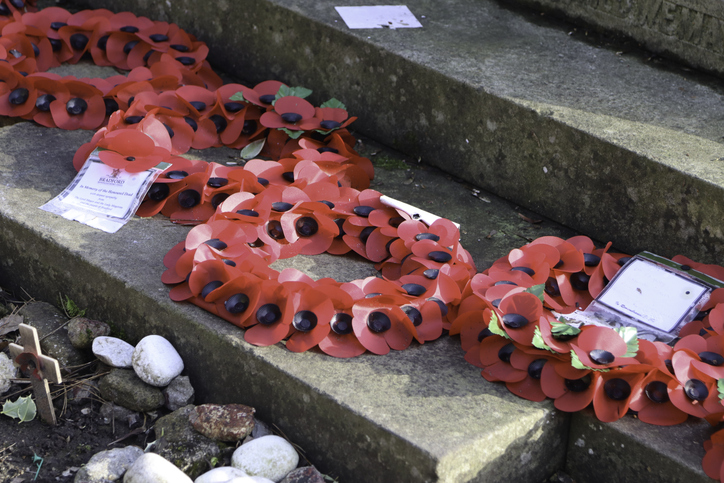At 11 a.m. today, much of the nation will fall silent in remembrance of those who have made the ultimate sacrifice in the service of our great country. For some, thoughts will focus on the enormous death toll of the two world wars. But many of us will be reflecting on losses from more recent conflicts.
During the 1991 Gulf War, I was shot down, captured, tortured and paraded on TV. My war back then was both short and unpleasant, but I was fortunate enough to return home to my family. Others have not been as blessed, so I will be thinking of countless RAF friends who have died both in training and in action over the years. My friend Mary Fowler, for example, will be thinking of her beloved dad who was killed during the Falklands war in 1982.
The Round Tower just outside the docks at Portsmouth was the best place to watch the big ships come in and Mary went there often in April 1982. Aged 13, she would hurry there after school, just in case. Her dad was a sailor on HMS Coventry and after months at sea, he was due home soon. Petty Officer Michael ‘Foxy’ Fowler was a wonderful father: patient, loving and always joking around. ‘We did so much together, and he was always full of fun,’ recalls Mary.
Many of us will be reflecting on losses from more recent conflicts.
I am dyslexic, and he devoted himself to helping me with reading and spelling. He was so patient and understanding. But also loved doing daft stuff, like throwing a wet flannel down the stairs at my head. There was always laughter in the house.
But in the wake of Argentina’s invasion of the Falkland Islands, Mary’s family would have to wait a while longer for the laughter to return. Rather than heading home, HMS Coventry had joined the vast naval taskforce steaming to the South Atlantic.
Foxy Fowler was regarded as a father figure, highly respected by all who knew him, especially the younger sailors – many still in their teens – who worked with him in the ship’s sonar control room. And as the ‘Damage Control Petty Officer’, he had to prepare the entire crew on how best to respond if the worst happened. Fire-fighting, first-aid, battle damage repair, and perhaps most importantly, preparation for an event every sailor fears: abandoning ship.
Back in Portsmouth, Mary Fowler’s family would watch the news on TV as the conflict unfolded and ships were sunk. It was difficult for the young teenager to make sense of what it all really meant. ‘We would sit at the kitchen table late at night, discussing what was happening. There was no doubt that thousands of miles away, my dad was in great danger. It was quite disconcerting.’
In Portsmouth, 25 May 1982 was a warm, slightly muggy day, with a stiff south-westerly breeze making the white horses dance on the Solent. As Mary got stuck into her homework that evening, 7,862 miles away Argentinian jets were screaming fast and low across Falkland Sound. Three of their bombs hit HMS Coventry which quickly sank under the onslaught.
Blissfully unaware of the events that had unfolded half a world away, Mary returned from school the next day to see a crowd gathered outside her home. ‘What had happened so that the house was full of my parents’ friends and colleagues? What did it all mean?’ It meant that her father was one of nineteen men who had perished during the attack and gone down with their ship.
It took a while, but eventually we accepted that he wasn’t coming home. And nor was a body. There would be no coffin. No funeral. There weren’t even any possessions to return. No photographs. No clothes. No letters. Not even a pen or comb. Everything had disappeared at the same time he did. He’d just gone. And that was the end of our story.
Of course, it wasn’t the end of Mary’s story and her father still looms large in family life. ‘Shopping one Christmas, I was in a lift with a man and his daughter. They were chatting and joking about presents and the upcoming holiday. I suddenly realised how much life I had missed with my own father. I still wonder what might have been. I still wonder where my Dad is. He is still a missing presence for me. His picture is in the hall and if my grandson Reggie asks, ‘where’s great-grandad Mike?’ I tell him he’s looking down, keeping watch over us from the stars.’
Over forty years after his death, I have no doubt whatsoever that Petty Officer Foxy Fowler will be keeping watch over his family this weekend. Mary tells me that Remembrance Sunday is an increasingly important part of their lives.
‘I don’t think about my dad every day,’ she says. ‘But this time of year the parades and the poppies brings it all sharply into focus.’ Mary works at a local college with young adults who have special needs.
My colleagues are wonderful and always ensure I have space at 11 a.m. on the 11th for a moment of quiet, personal reflection. And I talk to my students about the importance of remembrance, of course from both world wars, but more recent conflicts too. With the way the world is today, remembering the sacrifice made for our freedoms seems more important than ever.
Mary’s grandson Reggie is now an integral part of the family’s traditions. A member of the Squirrels Scout group for the under sixes, he has proudly marched with the unit flag at the Gosport Remembrance parade. He tells his friends it is in memory of his great-grandad Mike, who gave his life for his country.







Comments